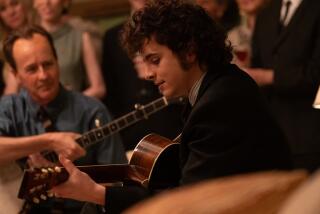Dylan Thomas elusive in ‘New Life’ details
- Share via
At the time of his death in 1953, Dylan Thomas seemed the epitome of everything expected of a poet: brilliant, impulsive, unconventional and reckless; a prodigious drinker, an incorrigible skirt-chaser, a marvelous storyteller and a spellbinding reader of his own and other people’s verse.
Even Philip Larkin, hardly a kindred spirit poetically or politically, felt a keen sense of loss: “I can’t believe that D.T. is truly dead. It seems absurd,” he wrote to a friend. “Three people who’ve altered the face of poetry, and the youngest has to die.” A lifetime of alcoholic excess truly exceptional by almost any conceivable standard had finally caught up with the 39-year-old poet.
Larkin’s placement of Thomas as one-third of a triumvirate, along with T.S. Eliot and W.H. Auden, gives some indication of his stature at the time. And despite a certain decline in the wake of his death, Thomas’ poetry is still esteemed. Its passion, color, dynamism and sheer sonority have given it a strong popular appeal; its inventiveness, complexity and often-maddening obscurity have contributed to its esteem by critics and cognoscenti.
At least one of his poems, “Do Not Go Gentle Into That Good Night,” has become a classic, known and loved by countless readers, along with his nostalgic story “A Child’s Christmas in Wales” and his evocative radio play “Under Milk Wood.”
Thomas’ latest biographer, British journalist Andrew Lycett, believes that the scope of the Welsh poet’s achievement extends beyond the familiar handful of his best-known works. Lycett sees Thomas as “an important figure in twentieth century culture, bridging the gap between modernism and pop, between the written and spoken word, between individual and performance art, between the academy and the forum.” (Whether this is necessarily a good thing is a question Lycett does not bother to consider. After all, Thomas could also be seen as part of a transition from the splendor of Keats to the lackluster ramblings of the coffeehouse.)
It seems fair to say that over the course of the last three decades, for better or worse, literary biography has edged out literary criticism as the first resort for readers trying to gain a better grasp of poems that have captured their attention. Yet, despite Lycett’s good intentions, a reader turning to this biography for guidance through the complicated syntax and imagery of Thomas’ verse will not find much help. Indeed, if any poetry could be said to cry out for old-fashioned New Critical close textual reading, it’s Thomas’.
What Lycett has done well, however, is provide us with a portrait of a man to whom creating poetry was as natural as drawing breath. Even the poems he wrote as a child show his love of words, sounds and images, coupled with a precocious aptitude for versification.
The research that has gone into this biography is genuinely impressive. Lycett has investigated seemingly everyone involved with any aspect of Thomas’ life, and he has certainly mastered his materials. His attitude toward Thomas, a man who might well have tried the patience of a saint, is balanced and fair-minded. Indeed, Lycett wonders how much he might have liked his subject had he met him: “I would certainly have enjoyed Dylan’s company, but found his unreliability annoying,” he suspects.
But, as Lycett repeatedly shows us, Thomas had charm. If, as a child, he was often rambunctious and mischievous, he was never mean. If, as an adult, he could be egocentric, inconsiderate and downright exasperating, he was also compassionate. And he had a saving sense of his own ridiculousness, at one point describing himself as “a short, ambiguous person in a runcible hat, feeling very lost in a big and magic universe.”
Yet, for all the solid research, skillful organization and colorful anecdotes that have gone into it, Lycett’s life of Thomas is not a very interesting book for the common reader. It may have value for students as a rich source of material about Thomas and the times in which he lived, but as a reading experience, it leaves much to be desired. It is full of information that doesn’t illuminate the psychology of the man or shed fresh light on the creative process that engendered his poetry.
Lycett may be charmed by Thomas, but he fails to get inside his head, presenting him from the outside, as others saw him, rather than as he saw himself. Following Thomas on his all-too-circular path from bottle to bottle and bed to bed, Lycett leaves us with a numbingly detailed chronicle of a frenetic, tediously dissolute life.
More to Read
Sign up for our Book Club newsletter
Get the latest news, events and more from the Los Angeles Times Book Club, and help us get L.A. reading and talking.
You may occasionally receive promotional content from the Los Angeles Times.







